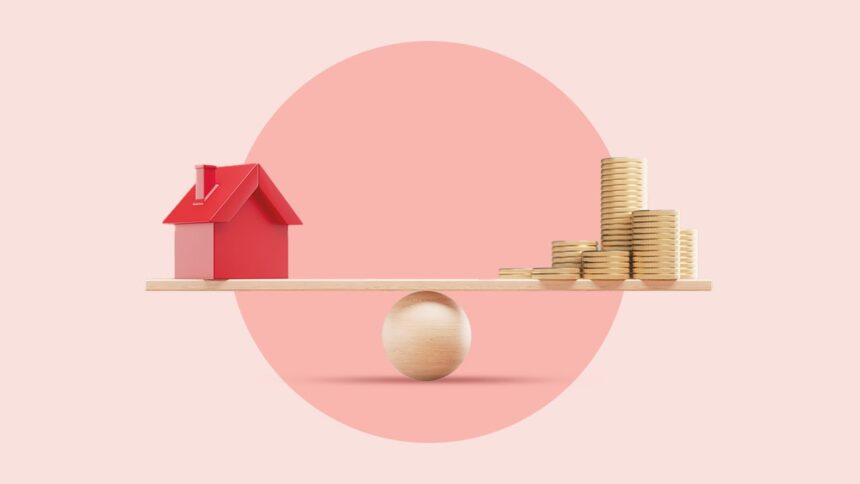
Photo by Getty Images. Illustrations by bankrate
If you’re watching Mortgage fees are nearly 7% You probably feel frustrated this year.
I feel that homeownership dreams are more expensive than ever. And for many future buyers, buying when the rates are high means growing your budget, calming down for a home that is less than you want, or putting your financial burden at risk.
However, here are some things that many buyers don’t realize: High mortgage fees actually create opportunities for savers. As someone who has been analyzing the cycle and interest rate trends in the housing market for over a decade, it’s the perfect time to pause your home search and instead put your money into a high-income savings account.
reason? Mortgage fees and savings rates are connected. When one side rises, it usually continues. This means that while you wait for better borrowing conditions, you can earn more with your savings.
Increased mortgage fees mean why it’s time to save money
Both mortgage rates and savings rates correspond to the same economic forces. when The Federal Reserve raises benchmark interest ratesborrowing costs will rise completely. This usually boosts mortgage fees and boosts the yields banks provide in savings accounts and certificates of deposit.
Academic research backs up this connection. 2022 study Using Federal Reserve data, we found a statistically significant relationship between mortgage rates and personal savings rates. As mortgage rates rise, so does the savings rate.
This connection is not perfect. Mortgage rates are generally long-term and directly related to the bond market, but savings rates respond to short-term rates and bank competition. Still, a wider trend is preserved. When mortgage fees rise, savings can come.
This gives consumers a great reason to park cash in their savings rather than end up buying a home during periods of high borrowing costs.
How a strategic suspension can put you in a stronger financial position
Rather than rushing to buy, you take the time to build your savings, and there are several benefits.
While you wait, your money is making more
When mortgage fees are high, banks and credit unions historically offer higher yields on savings accounts and CDs.
Today, many high-income savings accounts offer rates above 4%. This means that down payment funds could actually grow while waiting for better market conditions.
The larger the down payment, the better the mortgage conditions
The more you can put it, the better your loan terms will be. If you already have enough down payments, increasing the size of that down payment will allow you to qualify for a lower mortgage interest rate. Private mortgage insurance And reduce your monthly payments. It’s a win-win.
They also have more negotiation power with the seller.
Leave options open
Having money in a savings account that you can access at any time will give you flexibility and peace of mind. Keeping your funds liquid makes you ready to move quickly when prices drop or the right home comes.
You can also use the funds if you have an emergency, unemployment, or other life event that requires a large amount of cash. Rather than taking on debt or borrowing against the house, you can withdraw the money from the bank.
Would you like to buy it now? Patience pays
Let’s take that into consideration, assuming we’ve reduced 9% using the $400,000 home buyer example (the median down payment for first-time home buyers in 2024 is: National Association of Realtors).
Monthly Payment Comparison
| Mortgage fees | Monthly Payment (P&I) | Monthly savings compared to 7% rate | Yearly savings compared to 7% rate |
|---|---|---|---|
| 7.0% | $2,421.70 | – | – |
| 6.5% | $2,300.73 | $120.97 | $1,451.64 |
| 6.0% | $2,182.36 | $239.34 | $2,872.08 |
| 5.5% | $2,066.75 | $354.95 | $4,259.40 |
Based solely on principal and interest
The difference is important. If your rate drops from 7% to 6%, you can save more than $200 a month. You can save more than $85,000 on interest payments over the life of your loan. Most mortgage rate forecasts for 2025 do not expect interest rates to fall below 6%.
Meanwhile, park your down payment in a high-income savings account that earns a 4.5% APY and you can add hundreds or thousands of dollars to your home buying budget in just one or two years if the fees are high.
| Down payment fund | Interest earned in one year | Interest earned over two years |
|---|---|---|
| $10,000 | $450.00 | $920.25 |
| $25,000 | $1,125.00 | $2,300.62 |
| $50,000 | $2,250.00 | $4,601.25 |
Calculate potential savings growth Bankrate’s compound interest calculator.
Your Action Plan to Build Your Savings
- Open a high-yield savings account: Find an account with competitive rates, monthly fees and easy access to funds. Online Bank Usually, it offers the best yield. Often it’s 10-15 times more than traditional banks.
- Automate savings: Set up automatic forwarding to keep your home funds growing.
- Mortgage fee monitoring: use Bank Rates Tools to Track Rate Changes So you are ready to act when the market changes.
- Get ready: Keep your documents and credits in good condition and make sure you move faster when the time is right.
When should I come back?
Be aware of the mortgage fees trend. Experts predict that it could gradually decline in the second half of 2025 or 2026, but there is already a lot of volatility this year. As prices begin to fall meaningfully, you are well positioned with a bigger down payment and a stronger financial cushion to buy the home you really want.
High mortgage fees don’t have to derail your homeowner’s dream. Instead, pause them, see them as a sign to increase your savings and prepare for smarter purchases. Working with your money now in a high yield savings account is ready to make your move when the market is in your favor.


